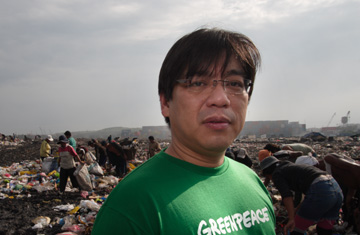
The West likes to outsource to Asia: countless low-cost factories and call centers have been relocated to the world's most populous continent. But Von Hernandez, a former literature professor from the Philippines, drew the line at another lucrative export from the developed world: mountains of trash. Across Asia, waste incinerators pump out clouds of dioxin and other harmful chemicals that come from processing imported garbage. It's a highly profitable business for waste companies, but the onslaught of pollutants can wreak havoc on local health.
With no one else speaking up, Hernandez took it upon himself to protect his homeland. In 1999 his relentless campaigning succeeded in making the Philippines the first nation in the world to ban waste incineration. The 40-year-old activist has since broadened his mission, taking it regionwide. "In the Philippines, public opinion is on our side, and we've gotten leaders to realize this is an issue that voters care about," says Hernandez. "But we still have to promote that same message across Southeast Asia."
Hernandez became aware of the Philippines' garbage problem in 1995, when he started working for Greenpeace. Every day the capital, Manila, creates 6,000 tons of trash, much of which festers in massive dumps where street children make a living picking through the ooze. In 2000, a giant landfill collapsed during a downpour, killing at least 200 people. Some government authorities called for waste incinerators to be built to eradicate the trash eyesores; as a side benefit, the Philippines could profit from burning imported trash from the industrialized world. But Hernandez's campaign quashed such plans. Even slum dwellers now know that dioxin from waste incineration can cause birth defects, while the toxic matter can poison future generations if it makes its way into the groundwater. Instead, Hernandez preaches the virtues of composting and recycling as a healthier way of tackling trash. "These are not high-tech solutions," he says. "But they work."